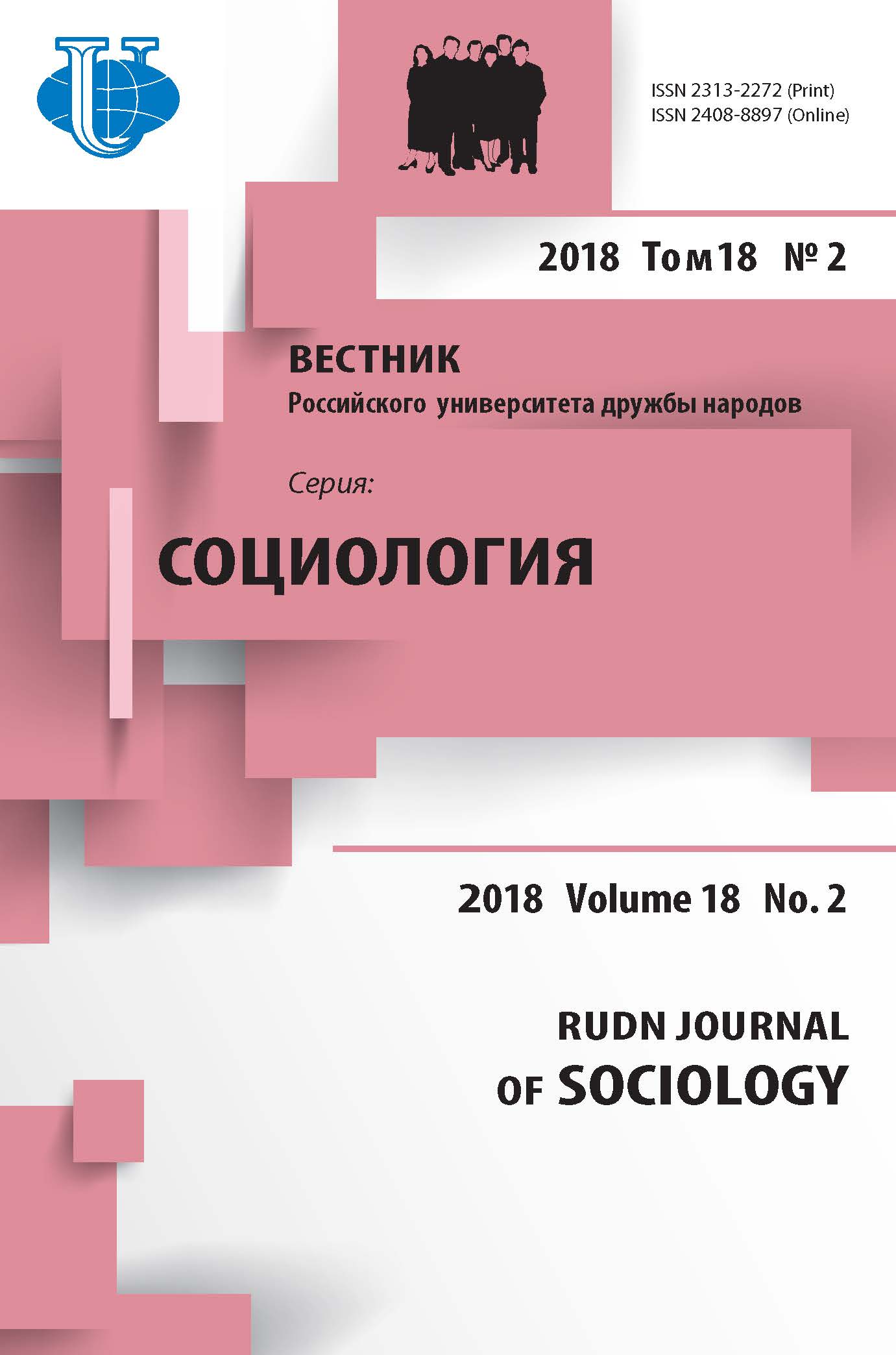The social well-being of the post-socialist countries’ youth (on the example of Russia, Kazakhstan and Czech Republic): Comparative analysis of fears and hopes (Part 2)
- Authors: Narbut NP1, Trotsuk IV1
-
Affiliations:
- Peoples’ Friendship University of Russia (RUDN University)
- Issue: Vol 18, No 2 (2018)
- Pages: 284-302
- Section: Surveys, experiments, case studies
- URL: https://journals.rudn.ru/sociology/article/view/18454
- DOI: https://doi.org/10.22363/2313-2272-2018-18-2-284-302
- ID: 18454
Cite item
Full Text
Abstract
The article is the second part of the publication presenting the empirical results of the three-year study conducted by the Sociology Chair of the RUDN University in cooperation with foreign colleagues to compare the worldview priorities of the today’s student youth. Due to the article size limitations the authors divided the data into two parts: in the first part, they focused on identifying values of three groups of students, which serve as reference points specifying the social action limits and criteria for assessing events and situations. In the second part, the authors continue to characterize values of the younger generations of the post-socialist countries relying on the empirical data collected with another questionnaire focusing on the students’ fears and hopes. In recent decades, the catastrophic/crisis consciousness has been widely studied and social fears were institutionalized as an important subject of sociological analysis. However, value orientations and mass fears are still rarely recognized as interrelated in empirical studies, although real and ‘normal’ fears (total and routinized in the contemporary risk society in U. Beck’s terms) are a key indicator of value orientations even if they are not real but presented as such by the media. Serious modifications of the Russian questionnaire in the Czech and Kazakhstan surveys do not allow for broad comparisons or generalizations; however, the empirical results reveal key life priorities and fears of the students (considering employment, incomes, personal relationship, health, education, etc.), general level of the youth’s anxiety, main strategies to overcome uncomfortable situations, and factors that determine anxiety. The authors conclude that (a) the social well-being of the student youth is very ambiguous in all three countries; (b) in general, fears and hopes of the Russian youth are more similar to their Kazakhstan peers; (c) the Czech students are more certain on a number of issues, which proves their stereotypical western individualism as compared to the Russian ‘traditionalism’.
Keywords
About the authors
N P Narbut
Peoples’ Friendship University of Russia (RUDN University)
Author for correspondence.
Email: narbut_np@rudn.university
-
Miklukho-Maklaya St., 6, Moscow, Russia, 117198I V Trotsuk
Peoples’ Friendship University of Russia (RUDN University)
Email: trotsuk_iv@rudn.university
-
Miklukho-Maklaya St., 6, Moscow, Russia, 117198References
- Beck U. Obshhestvo riska. Na puti k drugomu modern [Risk Society: Towards a New Modernity]. Moscow: Progress-Traditsija; 2000 (In Russ.).
- Gorshkov M.K. Fobii, ugrozy, strahi: socialno-psihologicheskoe sostojanie rossijskogo obshhestva [Phobias, threats, and fears: The social-psychological state of the Russian society]. Sociologicheskie Issledovanija. 2009: 7 (In Russ.).
- Iljasov F.N. Fenomen straha smerti v sovremennom obshhestve [The fear of death in the contemporary society]. Sociologicheskie Issledovanija. 2010: 9 (In Russ.).
- Prizrachnye ugrozy: rossijanam ne svojstvenen paranoidalnyj strah pered vneshnim mirom [Phantom threats: Russians do not have paranoid fear of the outside world]. http://fom.ru/ Mir/10097 (In Russ.).
- Spokojno ili trevozhno zhivetsja rossijanam? Rossijane o nastroenijah v strane i sredi blizkih [Are Russians calm or anxious? Estimates of the public mood and the attitudes of one’s relatives]. http://fom.ru/obshchestvo/10367 (In Russ.).
- Strahi rossijan [Fears of Russians]. https://www.levada.ru/2015/08/18/strahi-rossiyan-3 (In Russ.).
- Rost tsen i ugroza vojny: sociologi uznali glavnye strahi rossijan [The rise in prices and the threat of war: Sociologists revealed the main fears of Russians]. https://ria.ru/society/ 20170927/1505641503.html.
- Freud S. Isterija i strah [Hysteria and Fear]. Per. s nem. A.M. Bokovikova. Moscow: OOO STD; 2006 (In Russ.).
Supplementary files













